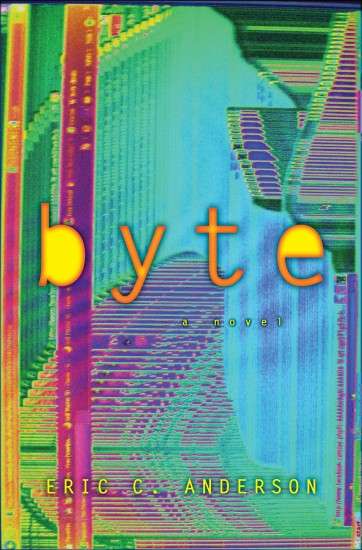Byte by Eric C. Anderson
EDITOR’S NOTE: Shortly after this interview was conducted, BookTrib learned that Eric C. Anderson had passed away. Eric’s literary contributions, through his fiction writing to his understanding of the complex intelligence and military challenges facing Western democracies, are incalculable. He was an exemplary and remarkable human being who will be greatly missed by all who knew him.
It’s August 2025 and Vladimir Putin wants to ease himself into a secure and wealthy retirement. To install his successor, he needs to destroy the power of the oligarchs. How? Wipe out billions of dollars they think are secure in their bit-coin accounts. How? One of Putin’s operatives blackmails a cyber wizard woman in Montgomery, AL, a recent immigrant from India, Dr. Adya Bakshi.
Does the U.S. government care? Yes. We don’t love the oligarchs but we love stability. So when the CIA gets wind of Putin’s plan, the agency turns to another cyber wizard, a black woman who smashed her red Ducati ST4S motorcycle into a concrete wall at 120 mph and became a paraplegic, for help.
Her friends call her “Roller” because she’s fast in her wheelchair. In the CIA she’s called “the Veterinarian” because she cages big dogs and brings the bits and bytes to heel. Usually with keystrokes, but she also carries a 9mm.
Thus we’re off and running in Byte (Dunn Books), the new thriller from former U.S. intelligence officer Eric C. Anderson who produced more than 600 articles for the President’s Daily Brief.
Yes, it’s great fiction, but what makes the thrill real is that Anderson knows stuff.
Back in 1980, he started programming on an Apple II. And he’s kept up. He knows today’s bits and bytes and how to break into a bit-coin blockchain. (About halfway through Byte are two-and-half pages solid with code – apparently the start of what you need.)
He knows Washington, from machinations within the CIA to how the CIA knows what it knows. (Anderson says waterboarding works best on people who don’t swim. “How many Middle Easterners or Afghanis have you met in a swimming pool?”)
He knows Moscow, from Kremlin machinations down to the gritty streets. (In a funky cafe at 45 Starokonyushennyy, Pereulok, a Muscovite cyber wizard, comes for clandestine meeting and is discouraged by no-smoking signs. “Who goes to drink coffee without a cigarette? At this pace Russia would no longer be Russia.”)
And he knows how, in this shadowy world, conspiracies and betrayals nest within each other like Russian dolls. (One bit player in Byte is Oleg Deripaska, in the real world an oligarch tied to Paul Manafort.)
So, with conspiracies and betrayals on board, Byte roars like Roller’s beloved Ducati…roars from Montgomery to Washington to Moscow. And onward:
In a Budapest hotel suite, a CIA operative who happens to be Roller’s brother grabs a bad guy, whacks him with horse sedative, stuffs him in a duffel bag, stuffs the duffel bag in the trunk of a Mercedes and heads for the U.S. Air Force base in Aviano, Italy.
In Beijing, another bad actor gets “one hell of a public trial, then a quick march out to the backyard and a bullet in the head.”
Roller warns in Byte’s last sentence, “You don’t want an angry black woman in a wheelchair armed with a 9mm and a computer chasing you down.”
In a recent interview, Anderson observed that, now with cyber capabilities, states and non-state actors can put into practice the “Five Rings” Theory of retired U.S. Air Force Colonel John Warden. Warden emphasized attacking an enemy’s inner “rings” – the innermost being “Leadership,” surrounded by what he labeled “Organic/ System Essentials/Key Production,” surrounded by “Infrastructure.”
What Warden had in mind was using air power, and for a long time his theory was criticized as applying mostly to attacks on developing and weaker regimes. But cyber power can be used against the most advanced nations, disrupting everything from financial networks to electrical grids and even undermining leadership.
What flows from this? With a PhD in political science, Anderson has the perspective to say it’s the end of our world organized by nation-states, a world that came into being only with the Treaty of Westphalia in 1648. With significant cyber power in the hands of non-state actors, welcome to a less organized world.
What is the United States doing about this? Anderson notes, approvingly, that U.S. Cyber Command is moving from a posture that was 95 percent defensive to one that increasingly emphasizes going on the offense. To cite a recent op-ed in The New York Times, this shift is intended to “deter adversaries through preemptive cyberattacks” – and Anderson believes it will.
Anderson also approvingly notes that, within U.S. defense and intelligence, cyber is giving great opportunities to people who have not been well represented: women and minorities. Some of the very top-level U.S. government programmers are coming from India, as does Byte’s Dr. Adya Bakshi.
Let’s hope the real top-level U.S. government programmers sleep more easily than she can.
Eric C. Anderson keeps his characters and his readers on knife’s edge.
Byte is now available to purchase.
Buy this Book!
Amazon






Miss u cousin